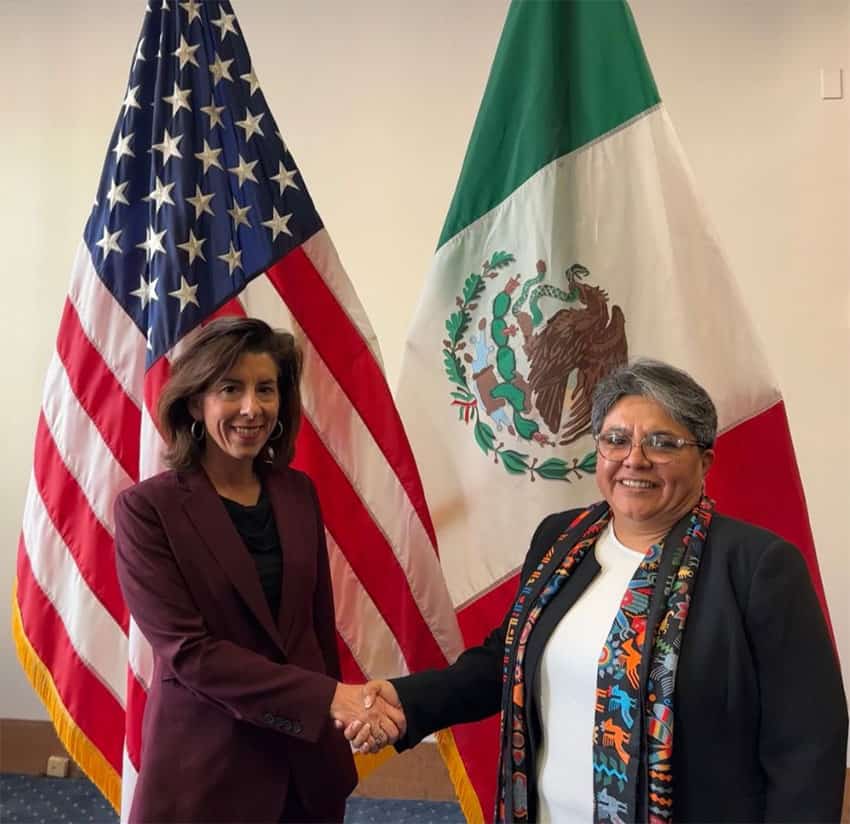Mexico and the United States will work together to lure companies to North America from Asia, the Economy Ministry (SE) said Friday.
After a meeting between Economy Minister Raquel Buenrostro and U.S. Secretary of Commerce Gina Raimondo, the SE said that those two officials will collaborate to put together a “joint presentation” to the private sector “to disseminate the opportunities and economic and fiscal benefits that both countries offer for the relocation of companies.”
The presentation will be put forward in the first two months of 2023, the ministry said in a statement.
Buenrostro said last month that over 400 North American companies already “have the intention to carry out a relocation process from Asia to Mexico.”
The ongoing United States-China trade war, proximity to the U.S., USMCA free trade pact-associated benefits and affordable labor costs are among the reasons why many companies are looking to shift operations to Mexico.
The SE said Buenrostro and Raimondo discussed a range of issues at their meeting in Washington, “among which the relocation of companies from Asia to North America and the strengthening of supply chains stand out.”
They particularly focused on issues related to the printed circuit board and semiconductor sector, the ministry said.
The United States earlier this year invited Mexico to take advantage of massive U.S. investment in the semiconductor industry. The U.S. Department of Commerce released a strategy in September outlining how it would implement US $50 billion from the CHIPS and Science Act of 2022, an executive order that U.S. President Joe Biden signed in August.

According to the SE statement, Buenrostro and Raimondo agreed that “the relocation of companies is a historic opportunity for the strengthening and economic integration of North America,” where the USMCA has been in effect since the middle of 2020.
“Through [the U.S.-Mexico] High-Level Economic Dialogue, both governments agreed to strengthen coordination to create better [economic] conditions and accelerate the arrival of new investment to Mexico,” the ministry said.
It noted that Buenrostro highlighted that Mexico has the workers companies that relocate here will need, and that she and Raimondo “emphasized the importance of the Economy Ministry acting as a one-stop shop for the attraction of capital.”
In other words, the SE should issue all “permits and authorizations required for the establishment of new companies” in Mexico.
The ministry also said that Buenrostro and Raimondo agreed that energy security, food security and national security are “the main pillars on which the region’s economic development rests.”
In a brief press release, the U.S. Department of Commerce said that the two officials discussed “how Mexico and the United States can collaborate to develop more resilient supply chains.”
“They also discussed areas of mutual interest such as renewable energy,” it added.
Buenrostro’s talks with Raimondo came a day after she met United States Trade Representative Katherine Tai. At that meeting, the economy minister proposed establishing “trinational working groups” that would meet in December and early January to “deal with the different aspects of” the energy dispute between Mexico and its two North American trade partners.
In July, both the U.S. and Canada requested dispute settlement consultations with Mexico, arguing that the Mexican government is violating the USMCA with policies that favor state-owned energy companies over private and foreign ones, including many that generate renewable energy.
Mexico News Daily
